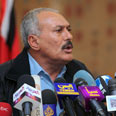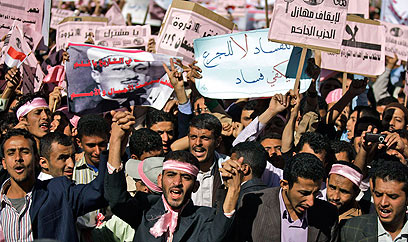
'No resetting the clock.' Barak
צילום: רויטרס
Yemen president says won't extend presidential term
Saleh vows not to pass on reins of government to his son, call on opposition to freeze all planned protests, rallies, sit-ins. 'Interests of the country come before our personal interests,' he says
Yemeni President Ali Abdullah Saleh, a key US ally against al Qaeda, said on Wednesday he will not seek to extend his presidency in a move that would end his three-decade rule when his current term expires in 2013.
Eyeing protests that brought down Tunisia's leader and threaten to topple Egypt's president, Saleh also vowed not to pass on the reins of government to his son, but asked the opposition to hold down on protests.
"I present these concessions in the interests of the country. The interests of the country come before our personal interests," Saleh told his parliament, Shoura Council and members of the military.
"No extension, no inheritance, no resetting the clock," he said, making reference to ruling party proposals to institute term limits that had been seen as allowing him to run again.

Protestors in Sana'a (Photo: AP)
His remarks came a day before a planned large rally, dubbed a "Day of Rage", organized by the opposition that was seen as a barometer of the size and strength of the Yemeni people's will to follow Egypt and Tunisia in demanding a change of government.
"I call on the opposition to freeze all planned protests, rallies and sit-ins," Saleh said.
Yemen, already teetering on the brink of becoming a failed state, is trying to fight a resurgent al Qaeda arm, cement peace with Shiite rebels in the north and quell separatism in the south, all in the face of crushing poverty that has left a third of Yemenis suffering from chronic hunger.
Saleh had already offered some smaller concessions on presidential term limits and pledged to raise salaries of civil servants and military personnel by around $47 a month, no small move in a country where about 40 percent of the population lives on less than $2 a day.
Yemen's current rules would require Saleh to step down as president when his term ends in 2013. But some members of his ruling party riled the opposition late last year by floating a proposal to lift that limit.
Yemen's opposition tried to rally against the idea in December, but failed to bring large numbers to the street. Last week, however, the Yemeni opposition succeeded in bringing around 16,000 people to the streets to demand a change in government. Some called for Saleh to leave.
- Follow Ynetnews on Facebook










